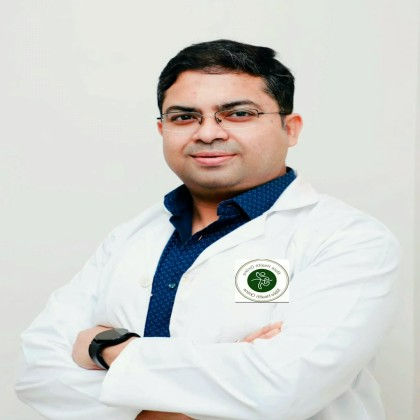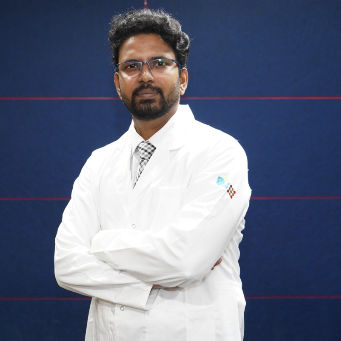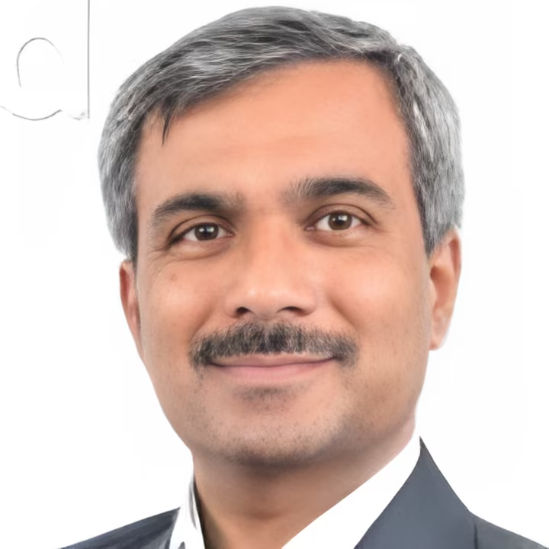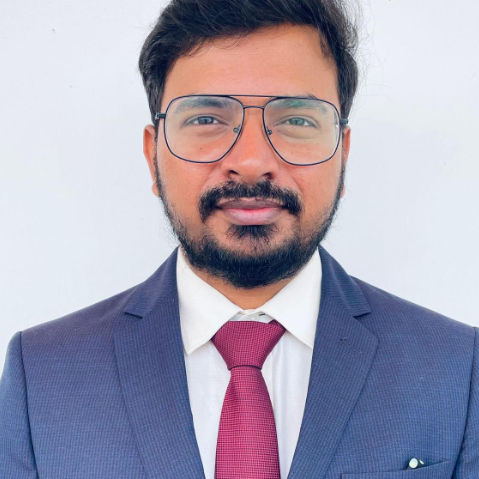Welcome User
Relevance
Best Online Doctors for Urology (10 doctors)
Book appointment for a trusted Urologists in Chinagadila. Check doctor fees, available slots & locations. Apollo 24|7 features some of the top Urologists in Chinagadila who have experience in treating conditions such as Urinary infection, kidney stones, traumatic injury and more. You can book online consultations & physical doctor appointments via Apollo 24|7. Compare Urologists fees, experience and more, find a specialist doctor near you. Apollo hospitals has a renowned Urology department in Chinagadila.
No doctors available for physical visits. Showing doctors for online consultations only.

Dr. Sateesh Marriwada
Urologist
17 Years • MBBS, MS (General Surgery), Mch ( Genito Urinary Surgery)
Visakhapatnam
Apollo 24|7 Clinic - Andhra Pradesh, Visakhapatnam

Dr Tharaka Mourya Nutulapati
Urologist
7 Years • MBBS, MS (General Surgery), Mch ( Urology)
Visakhapatnam
Apollo 24|7 Clinic - Andhra Pradesh, Visakhapatnam

Dr. Prabir Basu
Urologist
19 Years • MBBS, MS General Surgery, DNB Genito-Urinary Surgery
Jodhpur Park
Dr. Prabir Basu urology clinic, Jodhpur Park
(175+ Patients)

Dr. Adittya K Sharma
Urologist
16 Years • MBBS MS MCH
Lucknow
Dr A K SHARMA, Lucknow
Dr. Mohammed Rehan Khan
Urologist
8 Years • MBBS, MS (General Surgery), Mch (Urology)
Barasat
Diab-Eat-Ease, Barasat

Dr. Sudhakar G V
Urologist
25 Years • MBBS, MS(Gen.Surgery), DNB Urology
Bengaluru
Apollo Clinic, JP nagar, Bengaluru

Dr. Pavan Kumar S K
Urologist
11 Years • MBBS, MS , Mch( Urology) DNB (Urology)
Bengaluru
Apollo Clinic, JP nagar, Bengaluru

Dr. Ramesh H
Urologist
16 Years • MBBS, MS , Mch( Urology)
Bengaluru
Apollo Clinic, JP nagar, Bengaluru

Dr. Kunal Kumar Mehar
Urologist
10 Years • Mbbs, Ms, Mch
Bengaluru
Apollo Medical Center, Marathahalli, Bengaluru

Dr. M Paul Naveen
Urologist
7 Years • MBBS,MS,Mch
Manikonda Jagir
Apollo Clinic, Manikonda, Manikonda Jagir
Book Appointment for Urologist in Chinagadila
Apollo 24|7 offers a seamless way to book a consultation with a top urologist in Chinagadila. The platform allows you to schedule an appointment via online or phone at a time that suits you best. With experienced specialists from leading hospitals in the network, you can trust you’re in good hands. Book your consultation with the leading urologist in Chinagadila through Apollo 24|7 today.
Who is a Urologist?
A urologist is a medical specialist who specialises in diagnosing and treating diseases of the urinary tract and male reproductive system. Urologists in India earn a 5.5-year Bachelor of Medicine, Bachelor of Surgery (M.B.B.S.) degree before pursuing a two-year Master of Surgery (M.S.) in Urology or a three-year Master of Chirurgie (M.Ch.) in Urology. They can also seek a Diplomate of National Board (DNB) in Urology for additional specialisation. Urologists have significant urology training after graduating from medical school, with an emphasis on the kidneys, ureters, bladder, urethra, prostate, and male genitalia. Urologists also play an important role in preventative care, assisting patients to maintain good urological health through frequent check-ups and early intervention.
What Do Urologists Do?
The best urologists in Chinagadila offer a comprehensive range of services to diagnose, treat, and manage urological conditions. As highly skilled urology specialists in Chinagadila, they employ various tests and procedures to assess urinary tract and male reproductive health, developing personalised treatment plans for each patient. Some of their key responsibilities include:
Conducting diagnostic tests such as ultrasound, CT scans, MRI scans, and urinalyses to evaluate urinary system function and detect abnormalities
Managing chronic conditions such as benign prostatic hyperplasia (BPH), kidney stones, and urinary incontinence
Treating acute conditions like urinary tract infections and testicular torsion
Performing surgical procedures like endoscopic surgeries, lithotripsy (ESWL) for kidney stones, percutaneous nephrolithotomy (PCNL), ureteroscopy, and transurethral resection of the prostate (TURP)
They also specialise in the management of:
Urinary tract infections
Prostate cancer
Erectile dysfunction
Male infertility
Bladder cancer
Kidney cancer
Testicular cancer
Pelvic floor disorders
Neurogenic bladder dysfunction
Kidney stones
Benign prostatic hyperplasia
Why Visit a Urologist?
Consulting the top urologist in Chinagadila is essential for maintaining optimal urinary and male reproductive health, as well as preventing serious complications. Here are some key reasons why you should visit a urology doctor in Chinagadila:
Urinary symptoms: Pain while urinating, frequent urination, blood in the urine, or difficulty starting or stopping urine flow may indicate underlying urinary tract issues.
Male reproductive concerns: Conditions like erectile dysfunction, low testosterone, or male infertility are best managed by a skilled urologist.
Family history: If you have a family history of urinary tract problems or certain genetic conditions, regular check-ups with a urologist can help in early detection and prevention of potential issues.
Preventive care: Visiting a urologist regularly for check-ups and preventive care can help identify risk factors and prevent conditions such as urinary tract infections or BPH from developing or worsening.
Kidney stones: Severe pain in the flank or lower abdomen could be a sign of kidney stones, requiring prompt medical attention from a urologist.
Prostate issues: Men experiencing symptoms of an enlarged prostate, such as difficulty urinating or frequent urination, should consult a urologist. Regular prostate checks are also recommended for men over a certain age to screen for prostate cancer.
How Often Should You See a Urologist?
Visiting a urologist in Chinagadila at the right intervals is crucial for maintaining optimal urological health. The frequency of your visits to the best urologist in Chinagadila depends on various factors such as age, gender, family history, and individual risk factors. Here's a general guide on how often you should consult a urology specialist in Chinagadila:
High-risk patients: Men over 50 should undergo annual prostate screenings, especially if they have a family history of prostate cancer or are of African-American descent. High-risk individuals, such as those with a family history of prostate cancer, certain genetic mutations (e.g., BRCA1, BRCA2), or exposure to Agent Orange, should start screenings as early as age 40 and continue annually. Women over 40 who are at risk for bladder cancer or experience recurrent urinary tract infections (UTIs) should discuss urological screenings with their healthcare provider.
Low-risk patients: For men between ages 50 to 69, regular prostate cancer screening every 2 to 4 years is recommended after shared decision-making with their doctor. Men with a family history of prostate cancer, but not classified as high-risk, may start screenings at age 45 and continue periodically based on their PSA levels and other risk factors.
Annual checkups: High-risk patients, such as those with a strong family history of prostate cancer, should have annual checkups with a urologist in Chinagadila to monitor their condition closely.
Periodic evaluations: For those with a family history but not in the high-risk category, periodic evaluations (every 2 to 4 years) with the top urologist in Chinagadila are recommended to monitor any changes in their urological health.
How Can I Find the Best Urologist in Chinagadila Near Me?
Finding the best urologist in Chinagadila is easy with Apollo 24|7. Simply search for a urologist on their website and filter by location to find top urologists near you. When choosing a urologist, consider credentials, patient reviews, hospital affiliations, and experience. Look for urologists with expertise in advanced technologies like laparoscopic and robotic surgery, as well as specialisations in areas like urologic oncology or reconstructive urology. Proximity to your location is also important for convenience. By considering these factors, you can find a highly qualified and reputable urologist in Chinagadila who meets your specific needs.
Urology vs. Andrology: What's the Difference?
Can Urologists Perform Surgical Operations?
Urologists are trained to perform various surgical procedures related to the urinary tract and male reproductive system. These include minimally invasive endourological procedures, laparoscopic surgeries, and robotic surgeries. However, urologists typically focus on organ-specific surgeries. Urologists often collaborate with other surgical specialists for complex cases that require a multidisciplinary approach.
What Diseases or Conditions Do Urologists Treat?
Urologists are highly skilled in diagnosing and treating a wide range of conditions affecting the urinary tract and male reproductive system. If you're looking for the top urologist in Chinagadila near you, it's essential to understand the various diseases and conditions they can help manage. Here are some of the most common conditions treated by a urology specialist in Chinagadila:
Prostate cancer: A common type of cancer in men, often detected through PSA tests and biopsies.
Bladder cancer: Cancer that starts in the bladder, which can be detected through cystoscopy and other diagnostic tests.
Recurrent UTIs in women: Frequent infections that require ongoing management and preventive measures.
Overactive bladder: A condition characterised by a sudden urge to urinate, often accompanied by incontinence.
Stress incontinence: Loss of bladder control during physical activity or stress.
Kidney disease: Chronic or acute conditions affecting kidney function, which can be diagnosed through urinalysis and imaging tests.
Benign prostatic hyperplasia (BPH): Enlargement of the prostate gland, which can cause urinary symptoms.
Erectile dysfunction (ED): Difficulty achieving or maintaining an erection, which can be treated with various medications and therapies.
Male infertility: Issues related to sperm production, motility, or other factors affecting fertility.
Urinary tract infections (UTIs): Bacterial infections that can affect the kidneys, bladder, or urethra.
Kidney stones: Hard deposits that form in the kidneys and can cause severe pain and other symptoms.
Interstitial cystitis: A chronic condition causing bladder pain and frequent urination.
Urethral stricture: Narrowing of the urethra, which can impede urine flow.
If you experience any symptoms related to these conditions, it's crucial to consult with the urology doctor in Chinagadila for prompt diagnosis and appropriate treatment. The best urologist in Chinagadila will work closely with you to develop a personalised treatment plan that addresses your specific needs and helps you maintain optimal urological health.
What are the Procedures Performed by a Urologist?
When you visit the top urologist in Chinagadila, they may perform various diagnostic and treatment procedures to identify and manage urological conditions effectively. These procedures are crucial in ensuring accurate diagnosis and tailored treatment plans. Here are some of the most common procedures performed by a urology specialist in Chinagadila:
Digital rectal exam (DRE): A physical exam to check for abnormalities in the prostate, rectum, and surrounding tissues.
Prostate-specific antigen (PSA) test: A blood test to measure the level of PSA in the blood, which can indicate prostate cancer or other prostate issues.
Vasectomy: A surgical procedure for male sterilisation that involves cutting and sealing the vas deferens to prevent sperm from entering the semen.
Circumcision: Surgical removal of the foreskin of the penis, often performed for religious, cultural, or medical reasons.
Penile implant surgery: A procedure to treat erectile dysfunction by surgically placing a device that allows men to achieve an erection.
Urinalysis: Analysis of urine to detect infections, kidney disease, diabetes, and other conditions.
Cystoscopy: Insertion of a cystoscope through the urethra to examine the bladder and urethra for abnormalities.
Ultrasound: An imaging test to visualise the kidneys, bladder, and other parts of the urinary tract to diagnose stones, tumours, and other abnormalities.
Prostate biopsy: Removal of tissue samples from the prostate to check for cancer cells. This is often performed after an elevated PSA test or abnormal DRE.
Transurethral resection of the prostate (TURP): A surgical procedure to remove part of the prostate to treat BPH.
Lithotripsy: A procedure to break up kidney stones using shock waves.
Urodynamic testing: A series of tests to evaluate how well the bladder and urethra store and release urine.
By choosing the top urologist in Chinagadila, you can be confident that you'll receive the most appropriate diagnostic and treatment procedures for your specific urological needs and the highest quality of care.
What Does a Visit to a Urologist Cost in Chinagadila?
The price of seeing a urologist in Chinagadila might change based on a number of variables, including the kind of consultation (regular or initial), necessary tests, and diagnostic procedures. An initial appointment with a urologist in Chinagadila typically costs between ₹500 and ₹1,500. Follow-up consultations typically cost between ₹300 and ₹1,000, however they can be less costly. Advanced diagnostic treatments like CT scans and ultrasounds can cost as much as ₹10,000, while basic tests like blood testing and urine analysis can cost anywhere from ₹200 to ₹1,000. While planning a budget for a visit to an Chinagadila urologist, it's crucial to take these possible extra expenses into account.
FAQs
Should I go to a urologist for balanitis?
Yes, you should go to a urologist for balanitis. Since the condition is characterised by pain, swelling and irritation in the glans (head) of the penis, consulting a urologist is highly recommended. Urologists are trained to diagnose the condition accurately and provide appropriate treatment options to help manage and alleviate symptoms effectively.
Is balanitis a urinary tract infection?
No, balanitis is not a urinary tract infection. Balanitis is inflammation of the foreskin and head of the penis, often caused by factors like poor hygiene or infective agents. Urinary tract infections, on the other hand, affect the urinary system, including the bladder and urethra, but not the foreskin or head of the penis
Can a urologist treat erectile dysfunction?
Yes, a urologist can diagnose and treat erectile dysfunction. Urologists specialise in male reproductive health and have extensive knowledge about therapies specifically for erectile dysfunction.
What are the urology diseases?
Urology diseases include conditions affecting the kidneys, bladder, ureters, urethra, adrenal glands, and male reproductive organs. These encompass kidney stones, prostate problems, urinary incontinence, bladder disorders and cancer, among others.
Which problem is treated by a urologist?
A urologist can diagnose and treat multiple sexual and reproductive health conditions, including urinary tract infections (UTI), kidney stones, prostate enlargement (BPH), cancers of the genitourinary system
Can a urologist do a fertility test?
Yes, as experts in male reproductive health, urologists are qualified to conduct fertility tests. These tests help evaluate sperm quality or any structural issues that might be affecting fertility.
Do urologists deal with prostate cancer?
Urologists play an integral role in diagnosing and treating prostate cancer. They can perform surgeries like radical prostatectomies and manage ongoing care for patients with prostate cancer.
Should you see a urologist for a kidney infection?
Yes, kidney infections fall under the purview of a urologist. They are capable of providing appropriate treatment options and care plans for kidney-related issues.
What is the best doctor to see for a hernia?
For a hernia, it is ideal to consult a general surgeon or a surgical gastroenterologist. While urologists deal with some types of hernias, general surgeons have broader expertise in this area.
Can a urologist help with testicular cancer?
Yes, urologists specialise in diagnosing and treating conditions related to the male reproductive system, including testicular cancer. However, you will need to consult a urological surgeon for procedures such as orchiectomy (testicle removal) and an oncologist for chemotherapy or radiation therapy.